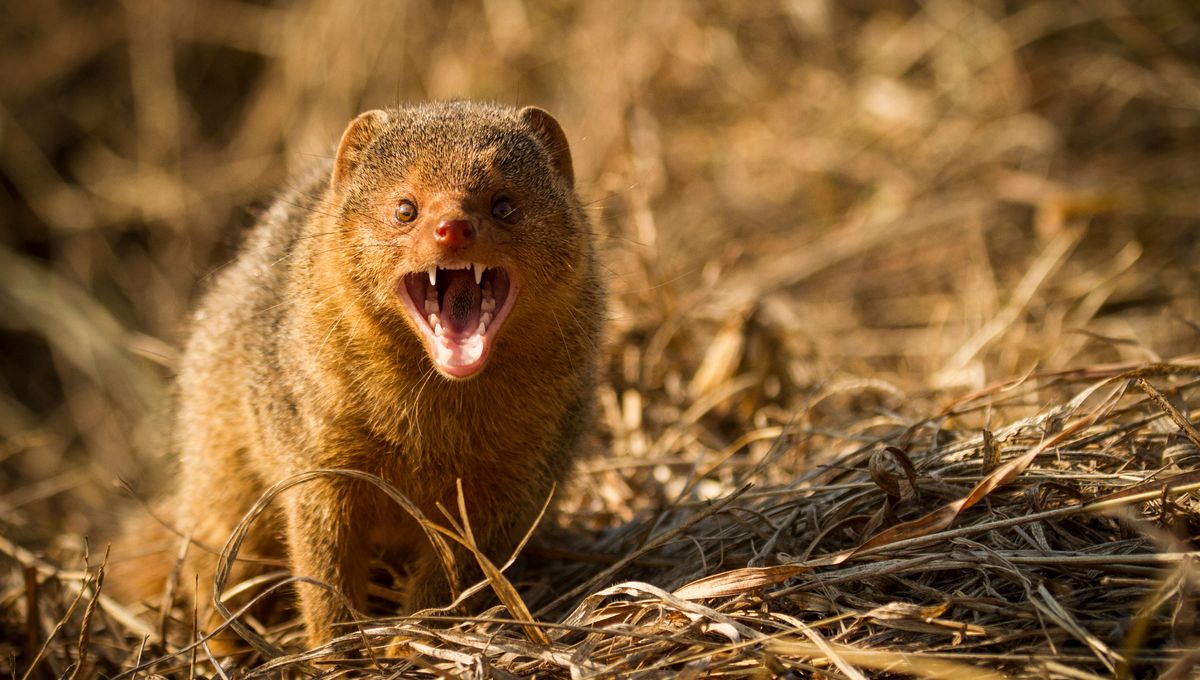
The term “warfare” is scary at the best of times and whether it’s applied to humans or animals it’s usually implied that nothing good is going to happen as a result. However, there is one species that actually depends on the acts of warfare for its very survival. Meet the mongoose.
More specifically two species of mongoose: the banded mongoose (Mungos mungo) and the dwarf mongoose (Helogale parvula) – both species live across Africa in social family groups. They typically eat small insects, lizards, and even snakes. While they are not large, dwarf mongooses are actually Africa’s smallest carnivore. Banded mongoose are around 30-45 centimeters (12-18 inches) long according to the Smithsonian’s National Zoo and they can appear sweet and fluffy, but their exterior is deceiving and hides an incredibly violent nature and lifestyle.
“Their whole society is built around warmongering,” Michael Cant of the University of Exeter, UK, told New Scientist.
These mongooses have been known to evict family members, commit infanticide, and don’t shy away from a spot of cannibalism – and that’s just within their own groups. Research has suggested that banded mongoose groups engage in wars with rival families as often as four times a month.
At the start of a mongoose war, opposing sides will gather into battle lines against each other. “Then they bunch up into writhing balls, chaotic and fast-moving, and you hear high-pitched screeches,” Cant told Columbian. “We call it mongoose warfare.”
This information has come from long-term studies that have been running at The Banded Mongoose Research Project in Queen Elizabeth National Park in Uganda and at the Dwarf Mongoose Research Project, which has studied habituated wild groups since 2011.
Studies like these have led researchers to believe that it could be the amount of males within the family that is the key difference in which group wins the fights. The males do most of the fighting and are often injured. This feeds into how the pups are cared for and how the family dynamics work within the group.
“For example, males are important to winning fights, and we know that (compared to females) males get more care when they’re young, are less often evicted and live longer,” Cant said in a statement. “So, the group may make decisions about who to invest effort in based on the importance of those members to fights.”
Quite why mongooses engage in so much violence is not too clear but it does have surprising knock-on effects for their pups. A recent study from the University of Bristol found that pup survival rates actually increased when the threat of conflict with a rival group was higher. This was thought to be because the adults of the group were on high alert looking out for rivals, and this increase in vigilance helped protect against all manner of threats, thereby keeping the pups safer as a result.
“Increased sentinel behavior is likely an attempt to gather more information about the other group. But sentinels also detect predatory threats and warn groupmates of danger, so vulnerable pups are potentially safer as a consequence,” said Professor Andy Radford, senior author of the study, in a statement.
Despite their violent nature and fierce battles, mongooses are also fascinating for their family dynamics. Unlike meerkats, which have one breeding pair, mongoose females all breed and give birth at the same time and the females raise the pups together. Banded mongooses also have unlikely friends in the warthog and have even been a feature in British folklore for their ability to “speak multiple languages“.
Source Link: Nobody Does Warfare Quite Like A Mongoose